Report 4 Translation Errors

Notice
This was translated by a translation company. Unfortunately, due to time constraints during litigation, there were some errors and unnatural usages of Japanese in the translation that went unchecked. These have been highlighted here.
Specific Errors
Original English
“Having problems with withdrawal”
“Control”
Original Japanese Translation
“離脱に悩まされている”
“コントール”
Meaning of Original Japanese Translation
“Having problems with withdrawal”
“Contol”
New Translation
制御
Explanation
The original English indicates “control” meaning that the doctor was having difficulty trying to control the withdrawal, whereas, the translation says "Contol" which is a brand name for the benzodiazepine drug Chlordiazepoxide.
Top of Page
Original English
“As outlined in Report 2, of particular note was the fact that he was still able to work in Japan, albeit on light duties, before the treatment began, but he struggled to complete his contract during the course of the treatment (subsequently cut short), after which he ended up in a state where he was unable to work at all again for over one year”.
Original Japanese Translation
“第二報告書で述べた内容で特に注目すべきことは、治療開始前に、軽い仕事ではあるが、彼はまだ日本で働くことができていた事実である。しかし、治療途中で契約通りの仕事をこなすことが難しくなり(続いて勤務時間を減らすに至った)、その後、1年以上も全く再度職につくことができない状態になってしまった。”
Meaning of Original Japanese Translation
“As outlined in Report 2, of particular note was the fact that he was still able to work in Japan, albeit on light duties, before the treatment began, but he struggled to complete his contract during the course of the treatment (subsequently leading to the reduction of work hours), after which he ended up in a state where he was unable to work at all again for over one year”.
New Translation
第二報告書で述べた内容で特に注目すべきことは、治療開始前に、職責の軽い仕事とはいえ、彼はまだ日本でなお勤務し続けることができていた事実であるが、治療途中で契約通りの仕事をこなすことが難しくなり(その結果、契約を途中で解約することに至った)、その後、1年以上の間、全く就労することができない状態になってしまった。
Explanation
The original English indicates not being able to work to the end of the employment contract stating that it (the contract) was subsequently cut short of its completion date.
However, the translation company translated this as saying the work hours had been reduced.
Top of Page
Original English
“Noted in the history that Wayne presented to our service was the list of additional symptoms that he developed following approximately 4 months of drug treatment”.
Original Japanese Translation
“ウェインが当科に提供した病歴の中で注目すべきことは、薬物治療開始後の約4~6カ月の時点で発現した更なる症状のリストであった。”
Meaning of Original Japanese Translation
“Noted in the history that Wayne presented to our service was the list of additional symptoms that he developed following approximately 4 ~ 6 months of drug treatment”.
New Translation
ウェインが当科に提供した病歴の中で注目すべきことは、薬物治療開始後の約4カ月の時点で発現した更なる症状のリストであった。
Explanation
Clearly a careless mistake: Stating 4 ~ 6 months instead of 4 months.
Top of Page
Original English
“Below is a list of complaints taken from Wayne’s history under Dr. Whitwell that may be used to try and rule out certain symptoms associated with his Benzodiazepine dependence”
Original Japanese Translation
“下記は、テハール医師のもとでのウェインの病歴の訴えのリストであり、これは彼のベンゾジアゼピン依存症に伴う特定の症状を除外するために用いられる可能性があるものである。”
Meaning of Original Japanese Translation
“Below is a list of complaints taken from Wayne’s history under Dr. ter Haar that may be used to try and rule out certain symptoms associated with his Benzodiazepine dependence”
New Translation
下記は、ウィットウェル医師のもとでのウェインの病歴の訴えのリストであり、これは彼のベンゾジアゼピン依存症に伴う特定の症状を除外するために用いられる可能性があるものである。
Explanation
Clearly a careless mistake: Stating Dr. ter Haar instead of Dr. Whitwell.
Top of Page
Original English
“Like his other dependence symptoms, the anxiety and depression type symptoms intensified again during the formal reduction process, and like his other dependence symptoms, the anxiety and depression type symptoms continued to improve following completion of the initial withdrawal phase of his formal withdrawal program – in the absence of Benzodiazepines, although, many symptoms did wax and wane for several months, which is consistent with a protracted withdrawal syndrome”.
Original Japanese Translation
“彼のその他の依存症状のように、不安症と抑うつ様の症状は標準的漸減療法中に再び激しくなり、また、彼のその他の依存症状のように、不安症と抑うつ様の症状は、彼の標準的漸減療法の初期離脱段階の終了後に改善し続けた-しかしベンゾジアゼピンが除外されると、多くの症状が数カ月に渡り一進一退した。これは持続性離脱症状と合致する。”
Meaning of Original Japanese Translation
“Like his other dependence symptoms, the anxiety and depression type symptoms intensified again during the formal reduction process, and like his other dependence symptoms, the anxiety and depression type symptoms continued to improve following completion of the initial withdrawal phase of his formal withdrawal program – but when the benzodiazepines were removed, many symptoms did wax and wane for several months. This is consistent with a protracted withdrawal syndrome”.
New Translation
彼のその他の依存症状のように、不安症と抑うつ様の症状は標準的漸減療法中に再び激しくなり、また、彼のその他の依存症状のように、不安症と抑うつ様の症状は、彼の標準的漸減療法の初期離脱段階の終了後に、ベンゾジアゼピン処方がない状態で、改善し続けた。しかし、多くの症状が数カ月に渡り一進一退し、これは遷延性離脱症状と
Explanation
The original English focuses on the fact that the “symptoms continued to improve in the absence of Benzodiazepines” which supports the fact the drugs were not beneficial at all.
The above passage consists of 2 sentences linked together using the connective “although”. The parts that says “symptoms continued to improve” and “in the absence of Benzodiazepines” form part of the same sentence.
However, the translation company combined “in the absence of Benzodiazepines” from sentence one with “many symptoms did wax and wane for several months” from sentence two which caused a shift in the intended focus of the passage.
It appears the translator failed to realize that “symptoms continued to improve” and “in the absence of Benzodiazepines” formed part of the same sentence. This should have been apparent by the connective “although” which serves as a clear divider indicating where each of the 2 sentences begin and end.
Top of Page
Original English
“However, we can see from the notes on page 21 of the Mental Health & Addiction Services patient file that Wayne later complained of an increase in light sensitivity, colour flashes, exaggerated after images, flashes, staggered focus etc following 4~6 months of Benzodiazepine exposure. This worsening of visual symptoms is also suggestive of withdrawal”.
Original Japanese Translation
“しかし、精神保健及び薬物依存療法科の患者のカルテ情報の21頁の記録に、ウェインはベンゾジアゼピン服用開始後4~6ヶ月の時点で、光に対する過敏症、色つきの閃光、過度の残像、閃光、フォーカスが定まらないこと等の悪化を訴えたとある。この視覚障害の悪化もまた離脱を支持するものである。”
Meaning of Original Japanese Translation
“However, we can see from the notes on page 21 of the Mental Health & Addiction Services patient file that Wayne later complained of a worsening in such things as light sensitivity, colour flashes, exaggerated after images, flashes, wobbling vision following 4~6 months of Benzodiazepine exposure. This worsening of visual symptoms is also suggestive of withdrawal”.
New Translation
しかし、精神保健・中毒治療科の患者カルテ情報の21頁の記録に、ウェインはベンゾジアゼピン服用開始後4~6ヶ月の時点で、光に対する過敏症の増加、色つきの閃光、過度の残像、閃光、視覚がコマ送りに見えること等を訴えたとある。この視覚障害の悪化もまた離脱を支持するものである。
Explanation
The original English indicates that the “increase” applied only to light sensitivity.
However, the translator mistakenly applied “increase” to all the items in the list suggesting that they all existed before the drug treatment which was not the case.
The mistake here is similar to those shown in article 2.2.7 and article 3.3.17 of the translation errors in Report Three. These are caused by the translator not understanding which items in a given list apply to either (A) a verb at the start of the list or (B) a conclusion at the end of the list (See article 2.2.7 and article 3.3.17 for examples).
If the verb “increase” did indeed apply to all the items in the above list, this would have been qualified using words like “an increase in such things as” or “an increase in the following” etc.
Also, the original English intends to indicate that the vision appeared staggered like seeing the environment in a frame by frame motion (as if the brain wasn’t processing the images as quickly as what the eyes were taking them in), whereas the translation indicates that the vision appeared to wobble or flicker back and forth.
Top of Page
General Errors
Notice
The following errors appeared generally throughout the report and so have been highlighted here without any references to specific articles.
Original English
“Acute Vestibulopathy”
Original Japanese Translation
“急性眩暈症”
Meaning of Original Japanese Translation
“Acute Vertigo”
New Translation
急性前提障害
Explanation
It appears the original translation can be used for “vestibulopathy” as well but refers more commonly to “vertigo” in general which leaves room for misinterpretation.
Top of Page
Original English
“Protracted withdrawal Symptoms”
Original Japanese Translation
“持続性離脱症状”
Meaning of Original Japanese Translation
“Persisting withdrawal Symptoms”
New Translation
遷延性離脱症状
Explanation
It appears the meaning is much the same but has now been changed to a term more commonly used in cases of drug dependency.
Top of Page
Original English
“Most likely”
Original Japanese Translation
“おそらく”
Meaning of Original Japanese Translation
“Perhaps”
New Translation
蓋然性は、極めて高い
Explanation
The original English indicates certainty of about 90% or more, whereas the translation indicates certainty of about only 40%. Needless to say, misinterpretations such as this would affect the tone of conviction presented in the reports.
Top of Page
Original English
“We”
Original Japanese Translation
“当職”
Meaning of Original Japanese Translation
“Our service / organization”
New Translation
我々
Explanation
In some instances the original English used “We” as a generic term to refer to “all parties”, however, the original translation did not accommodate these subtleties and referred only to the people who represent the report in every instance.
Top of Page
Original English
“Initially”
Original Japanese Translation
“初めて”
Meaning of Original Japanese Translation
“For the first time”
New Translation
当初では
Explanation
The original English indicates “the early stages” or “at the beginning” (e.g. of the treatment), whereas the translation indicates a first time occurrence.
Top of Page

The primary language of this website is English. Japanese appears as translations only (except for some original court documents).
These translations have been done by many different translators including me. Therefore, there are differences in quality and styles.
Please understand that I am not native Japanese and subsequently there are parts that may sound unnatural in Japanese.

Some parts of this website still have not been translated into Japanese. If anyone (native Japanese) would like to help on a volunteer basis, please contact mentioning the part you would like to translate. Thank you.

This website has been constructed by me personally for the purpose of raising awareness about doctor induced benzodiazepine drug dependency and litigation problems.
The purpose of this site does not include any form of retribution. Also, for privacy reasons the defendants’ names along with certain other names have been omitted from all public documentation contained herein.
There are no other persons / parties involved and it in no way represents any organization or activist type movements.
It is not intended as medical or legal advice – please see Disclaimer.
According to The International Narcotics Board 2010 Report, Japan has the highest average consumption rate of “anxiolytic” benzodiazepines in Asia with the only exception being Iran (See Figure 20 on page 35).

Although use for this indication is lower than in many European countries, Japan has the highest average consumption rate of “sedative-hypnotic” benzodiazepines in the world with the only exception being Belgium (See Figure 26 on page 39).
The Ashton Manual contains expert advice on benzodiazepines and how to withdrawal written by world renowned expert Prof. Heather Ashton.

The withdrawal schedules provided in the manual are only intended as "general guides". Each person's experience of withdrawal is unique and the course of withdrawal depends on many factors.
Don’t think benzos are dependence forming on prescription doses?
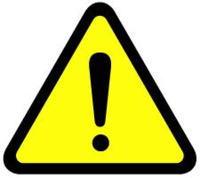
Think again!
“Tolerance and dependence can develop if benzodiazepines are used regularly for longer than 2-4 weeks. There is no minimum dose, for example tolerance and dependence have been observed after the regular use of 2.5-5mg of diazepam.”
Professor Heather Ashton: Emeritus Professor of Clinical Psychopharmacology, University of Newcastle upon Tyne, England
Stevie Nicks: Tell me Lies
Doctor: Benzodiazepines will help to calm you down and keep you from going back to coke…

"Singer Stevie Nicks has publicized the dangers of Klonopin (benzodiazepine) by describing her own detox from the prescription drug as "hellish" and worse than withdrawing from cocaine or heroin.
"Klonopin turned me into a zombie,” she told US Weekly in 2001.

You may be interested to see the notes on corrections of Japanese translation errors, which were contained in the dependency medical report translations, together with explanations of the nature of these errors, and consider their potential implications on the case.
This is very interesting!
I went from being barely able to walk when I was on benzodiazepines to being able to squat 180kgs following abstinence and rehabilitation.

What are benzos for again?

The only time I’ve ever needed to visit a psychologist in my life was AFTER (wrongfully) being prescribed benzodiazepines…

It seems the truths about the potential dangers of benzodiazepines are slowly coming out but with so many cases of prescription dependency worldwide there is clearly a long way to go.
Also, in my experience it appears as if dependency to prescription drugs leans toward a subject of taboo – almost as if society is succumbing to it.
However, is keeping these problems locked up in the closet going to help anyone or change anything?
At first it was difficult sharing my case and story online because it necessitated disclosing personal information, however, I felt the need to come out and help raise awareness outweighed this…
THE WRITING IS
ON THE WALL
for benzodiazepine use

Dr Andrew Byrne
Redfern NSW Australia
Benzodiazepine Dependence, 1997
“If any drug over time is going to just rob you of your identity [leading to] long, long term disaster, it has to be benzodiazepines.”

Dr John Marsden,
Institute of Psychiatry, London
November 1, 2007
“Benzos are responsible for more pain, unhappiness and damage than anything else in our society.”

Phil Woolas MP,
Deputy Leader of the House of Commons,
Oldham Chronicle, February 12, 2004
“The benzodiazepines are probably the most addictive drugs ever created and the vast army of enthusiastic doctors who prescribed these drugs by the tonne have created the world's largest drug addiction problem.”

The Drugs Myth, 1992
“If there's a pill, then pharmaceutical companies will find a disease for it.”

Jeremy Laurance,
The Independent, April 17, 2002.
“To rely on the drug companies for unbiased evaluations of their products makes about as much sense as relying on beer companies to teach us about alcoholism.”

Marcia Angell MD
(Former) Executive Editor New England Journal of Medicine
“It is more difficult to withdraw people from benzodiazepines than it is from heroin.”

Professor Malcolm H Lader
Institute of Psychiatry London
BBC Radio 4, Face The Facts
March 16, 1999
“Withdrawal symptoms can last months or years in 15% of long-term users. In some people, chronic use has resulted in long-term, possibly permanent disability.”

Professor C Heather Ashton
DM, FRCP,
Good Housekeeping, 2003
“Clearly, the aim of all involved in this sorry affair is the provision of justice for the victims of tranquillisers.”

Both the High Court and Supreme Court Verdicts dismissed my case completely (100%), despite the comprehensive medical reports, expert opinions, and credible evidence...

Who's protecting society (the tax payers) whose money they receive as salary to protect the public?
As someone who has experienced both doctor induced benzo dependency and the effects of the 3-11 disaster, I immediately became concerned about the overprescribing of prescription drugs to the many thousands of people in the disaster areas.
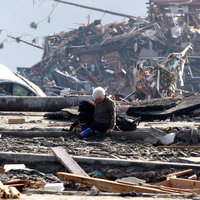
As it happened, I was writing my Supreme Court appeal in the midst of the disaster, so I took this opportunity to try and raise the alarm by including the following passage in my closing comments…
What worked well?
What didn't work so well?

For the interest of the reader, in this site I have given feedback on what worked well in my case and what could have been done better.
A lot of people were surprised that I did not bear a grudge against the prescribing doctor, but I felt anyone can make mistakes.

What got me though, was the fact he showed no remorse even after the evidence had been made clear.
The DSM-IV-TR diagnostic criteria for dependency proved to be a valuable tool in my case because it helped guide the arguments into place.

Initially the defense appeared to be dodging issues which resulted in both parties arguing on different planes.
However, once Addictive Medicine Specialist, Dr. Graeme Judson had introduced the application of the DSM-IV-TR criteria into the equation, it helped to define the arguments for litigation effectively preventing the defense from dodging issues.
(NB: There has been some controversy over the DSM, and apparently, doctors can also use these criteria to their advantage, so in my case, there was sufficient consultation with my lawyer.)
Seems people are all saying the same things over and over…

- I was like a zombie
- It felt like I was in hell
- It was much harder to come off benzodiazepines than anything else I'd ever had before
- It took a chunk of my life away
- It has destroyed my life
- The doctor never told me they were addictive / The doctor told me they weren’t addictive
- When I complained my condition was worsening the doctor prescribed me more...

Each one of us has a different experience of withdrawal.
The duration and degree of intensity can vary depending on the individual and there are many reasons for this.
The informed consent argument formed an integral part of the case because it was needed to prove negligence.

Without negligence there would have been no accountability, and therefore, no case from the outset.
In section 4 of his fourth report, Addictive Medicine Specialist, Dr. Graeme Judson explained the principles of prescribing and informed consent in relation to my case and sample applied.
The monitoring argument also formed an integral part of the case because it too was needed to prove negligence.
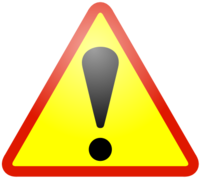
As above, without negligence there would have been no accountability, and therefore, no case from the outset.
As with informed consent, in section 4 of his fourth report, Addictive Medicine Specialist, Dr. Graeme Judson explained the principles of prescribing and monitoring in relation to my case and sample applied.

This section focuses on some of the apparent injustices of the Japanese courts in my case. To help highlight these, some parts of this section include cross-referencing between the High Court Verdict and the Dependency Reports which were all based on the official evidence and the DSM-IV-TR diagnostic criteria for dependency.

- Our key witness was twice denied the opportunity to testify – once by the Tokyo District Court and once by the Tokyo High Court.
- The Tokyo District Court judge raised an issue in the defense's favour only after proceedings had ended totally denying us any opportunity for rebuttal.
- The Tokyo High Court judge chose to use the package inserts from the drug companies to determine the amounts at which benzodiazepines could be deemed addictive, completely ignoring the extensive evidence (literature, expert opinions etc) submitted to the contrary.
- The courts made no issue over the prescribing doctor diagnosing me with one thing and treating me with drugs used for something completely different.
-
More than half the applied DSM-IV-TR diagnostic criteria for dependency were not addressed in the verdict.
- The presiding High Court judge was replaced half way through proceedings by a judge who knew absolutely nothing about the case or benzodiazepines before the verdict was delivered.
It is not uncommon for drugs in Japan to be prescribed in powder form

I was prescribed 5 different drugs, including 3 kinds of benzodiazepines mixed together in powder form (dispensed in sachets) and a tricyclic antidepressant, without being correctly informed about the drugs or the treatment.
When I returned to NZ, Addictive Medicine Specialist, Dr. Graeme Judson said “I can’t believe you made it through customs at the airport!”
Throughout this entire ordeal, I came to realize the importance of “Balance”.

As pressing as the court deadlines were and as demanding as the case was, without maintaining a balance in life including rest, recreation, work, socializing, diet, sleep etc. it would have been impossible to sustain.
However, it was always a razor edge fine line between making progress and maintaining health and balance.
Subsequently, it took a lot of skill and adapting.
Did You Know?
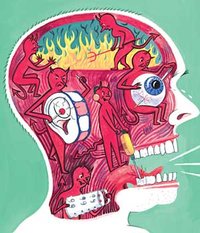
Tolerance doesn’t always develop across all symptoms.
For example, someone might develop tolerance to the hypnotic (promotion of sleep) effects but not to the anxiolytic (anxiety relief) effects, or they might develop tolerance to some symptoms of anxiety and not others. Tolerance to the various actions of benzodiazepines develops at variable rates and to different degrees (See The Ashton Manual).

When do you suppose my condition was at its worst?
- When I was experiencing moderate levels of work related stress?
- When I was working a high pressure job and involved in a rigorous court battle in another country and language against a world famous doctor, the hospital, and the teams of lawyers and entire networks that no doubt sat behind them?
The answer is A.

Why?
Because at the time of situation (B) above, I wasn’t being mislead by a doctor feeding me a cocktail of highly addictive prescription drugs.
Instead I was employing the use of practical (non-drug) stress management techniques learnt in New Zealand before I returned to proceed with litigation in Japan.
Same principles applied to coping with the affects of the 3-11 disaster...

I was warned about experiencing an inevitable down upon conclusion of my court case; much the same as what Olympians experience at the end of the games. I thought I’d be fine because I had my job and my hobbies.
However, when the time came I found myself dealing with it alone, jobless, penniless, and at one point homeless following the 3/11 disaster.
This has been an incredible challenge in itself, but as stated above, I was able to see this through without the need for drugs from misleading doctors.
A doctor that took the time to listen…

Whilst residing in state housing in Nagano, as an evacuee from Fukushima, I consulted a local ENT about ear pain from overuse of earplugs.
As we got talking he learned of my situation with regards to being displaced by the 3/11 disaster and Fukushima nuclear accident.
As a result, he also learned that I was under some stress.
However, instead of labeling me with some fancy diagnostic term and prescribing me drugs, he sat down and we discussed possible solutions as to how to I might be able to relocate, get my job back, etc.
He did this after his surgery had closed over a cup of tea – what a great doctor and what a great guy!
Cause for Alarm!

Consider this extract from:
A Review of David Healy's “The Psycho-pharmacologists III” by Professor Heather Ashton
How is it that the pharmaceutical industry has come to dominate the field?
Healy points out that drug companies “are now not simply confined to finding drugs for diseases. They have the power to all but find diseases to suit the drugs they have”.
Pierre Simon (Sanofi Pharmaceuticals) remarks: “In the beginning the pharmaceutical industry was run by chemists.
This was not so bad... Now most of them are run by people with MBAs... people who could be the chief executive of Renault, Volvo or anything.
They don't know anything about drugs.” The problem comes when a chemist presents an interesting drug to the financial analyst, who asks: “What is the market?”
The chemist has to decide for what indication the drug will be developed. If the indication is not there, it must be created.
It was difficult to get any relief from the ongoing symptoms

Unlike injuries where you may get some relief from adjusting your posture etc, with drug dependency in my case, the pain was both mental and physical and ran 24/7 regardless…

Ever wonder why the diazepam conversion rates differ from source to source?
Addictive Medicine Specialist, Dr. Graeme Judson explains as follows:
“The rate used for converting Diazepam equivalents tends to differ from source to source. This is because individual variation in clinical responses to “equivalent” doses can vary so close monitoring of patient response to substitution is necessary when converting from one Benzodiazepine to another.”
Many people have asked me why I fought as far as the Supreme Court of Japan and why I decided to set up this website.
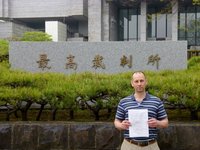
Regarding the former, I felt it was just simply wrong – people shouldn’t go to their doctor and come away suffering like that. I could see there was a significant problem in the current medical world that was affecting not only me but many others as well. I felt the problem needs to be brought to the attention of the authorities and there needs to be some accountability.
Regarding the later, knowing what prescription dependency is like, and being aware of the Effects on Us All, I felt the need to do something so that others aren’t led into suffering the same fate. This gave way to the idea of establishing this website.
Throughout this most grueling of challenges, I was always able to draw on inspiration from the All Blacks, and in particular captain Richie McCaw.

No matter how hard things got, or even when they were hard done by, they never complained and just got on with it.
AWESOME!
There were many challenges in my case.

These included fighting a world famous doctor in another country and language, acting as go-between for a harsh natured Japanese speaking lawyer and a sensitive natured English speaking doctor, making my Supreme Court Appeal whilst evacuating from Fukushima etc during the 3/11 disaster etc…
In my case, “confusion” appeared to be the main tactic of choice employed by the defense.

Enter the term “Autonomic Nervous Disorder” (The Perfect Smokescreen).
(Partial Reference: benzo.org.uk)
Journalists have regularly exposed the Benzodiazepine Scandal with stories of celebrity deaths attributed to benzo use as well as the blighted lives of ordinary people.
Benzodiazepines were, by all accounts, implicated in the deaths of:
- Elvis Presley
- Paula Yates
- Michael Jackson
- Heath Ledger
- Brittany Murphy
- Amy Winehouse
- DJ AM (a.k.a. Adam Goldstein)
- Anna Nicole Smith
- Margaux Hemingway
- Don Simpson
- David Foster Wallace
- Whitney Houston

I Will Always Love You
How anti-anxiety meds are killing celebrities
It used to be that hard drugs were the cause of celebrity overdoses…Of the celebrities who have overdosed on drugs in the past five years, eight appear to have taken prescription medications — specifically, a mix involving easily accessible anti-anxiety medications known as benzodiazepines or “benzos.”
Below are some of the skills I needed to call upon in my case, however, unlike my case where I was required to play an active role between two countries and languages, not all cases may require such input from the claimants.

- Analytical
- Language
- Translation
- Communication
- Cross cultural
- People
- Negotiation
- Coordination
- Research
- Formal writing
- IT
- Computer
- Stress management
- Time management
- Money management
- Health maintenance
- Self awareness
- Adaptation
- Flexibility
- Endurance
- Control
- Drive
- Belief
- Commitment
- Sacrifice
For many months and years I had to endure the effects and suffering of a horrible benzodiazepine dependency.

During my quest to seek recognition for this, I thought the defendant hospital, doctor and courts had a lot of nerve to turn around and tell me that I wasn’t dependent (despite having attended a drug rehabilitation program with follow-up consultations lasting more than a year)...
I included the quote in the top left corner of this site because many people thought I was crazy for pursuing my case.

However, my philosophy is we can either choose to do something, or choose to do nothing. The former gives way to hope for many people. The latter…? Whichever way, it’s all in our hands…
I first became acquainted with Prof. Ashton when my lawyer and I were desperately seeking literature stating that a patient can experience withdrawal symptoms even while still taking the drugs.
She subsequently provided this key information and later other useful information as well.
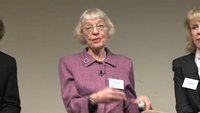
We maintained close contact ever since; making efforts to raise awareness about this massive social problem.
This work included the translation of The Ashton Manual in Japanese.
This section shows a variety of other benzodiazepine related videos that may be of interest.

This page has been set up to give readers the opportunity to share their comments.

If you wish to send a message of your own please do so by sending an email through the contact page.
Alternatively, you can use the Benzo Case Japan facebook page.
The amount of actual loss and damages in my case can be seen in the Official Loss and Damage Forms which are registered with the courts.

My Official Court Statement 2 may help give an idea of the nature of some of these damages.











